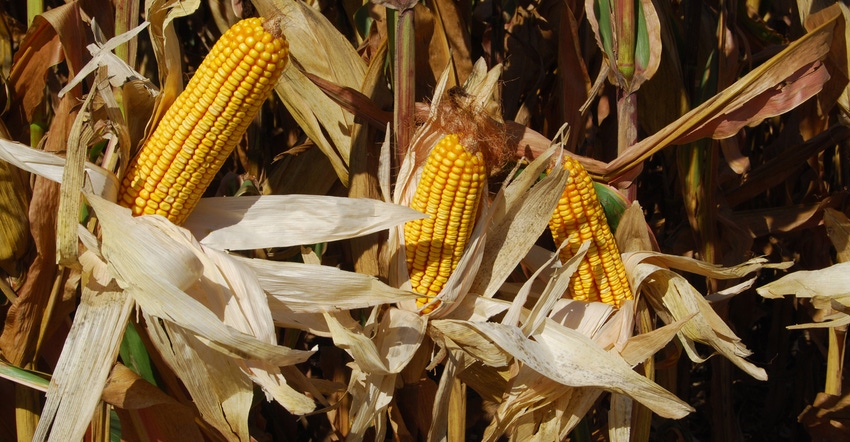October 5, 2018

Test weight of corn is an often-discussed topic. Growers are concerned when test weights are low and for good reason —discounts might be charged upon sale of the corn.
If low test weight is caused by premature death due to disease, drought, early frost or other environmental factors, we might also note that the shelf life of the corn in storage might be reduced. Of course, discussion of high test weights usually seems to inspire pride in the voice of those able to report it.
A bushel is an interesting thing. When we talk with young students about what a bushel is, we often show them a container that holds 32 dry quarts in volume, or 1.2445 cubic feet. However, when we sell that grain, we do not measure and sell by the volume that we unload at the elevator, but rather how many pounds we unload. When we sell, a bushel of corn is 56 pounds usually at 15% moisture, regardless of how much space that bushel takes up.
Measuring test weight
The test weight of corn is a measure of its bulk density, or how much a given volume of corn weighs. The equipment your grain merchandiser uses to measure test weight is a USDA-approved manual test weight apparatus that’s 1 dry quart. The operator fills it to overflowing, strikes off the top with a leveling stick, weighs it in pounds and multiplies that value by 32 to get your test weight.
Some moisture meters measure test weight, but these units are not official. As I understand, Iowa does not regulate test weight devices at elevators or processors.
What can alter test weight? Grain moisture is one of those items. As moisture of grain goes down, test weight usually increases. When we dry grain, the test weight usually increases because the dry matter in a kernel is denser than water. When a higher percentage of the volume is dry matter, the bulk density, and therefore test weight, increases. Remember, increases in test weight during drying do not result in increases in the effective weight of grain sold.
Grain quality can sometimes be a factor. If you have kernels that died prematurely, the tips of those kernels are not as firm, and do not have the density of a fully mature kernel. The kernels that died prematurely don’t pack as well into that given volume, and therefore have a lower test weight.
Is test weight related to yield?
There is quite a bit of variability between hybrids for test weight, and it does not automatically correspond to the overall yield level of the environment. You can find a hybrid in a specific year that yields more bushels per acre with a relatively low test weight, and sometimes find another hybrid with high test weights that doesn’t yield nearly as many bushels.
Agronomist Bob Nielsen from Purdue University, in his “Corn Test Weight” article, states, “There is little evidence in the research literature that grain test weight is strongly related to grain yield.”
What advantage do high test weights offer? If corn is above a 54-pound-per-bushel test weight, there is rarely a discount on price, but there rarely is a price bonus for having a high test weight, either. However, if you fill a semi with 1,000 bushels of corn (by volume), and that corn has a test weight of 52 pounds per bushel, you will only get paid for 929 of the 56-pound “market” bushels, plus likely getting a discount on the price per bushel. Alternatively, you will feel a lot better when that same semi with 1,000 bushels by volume has a test weight of 60 pounds, and you are paid for 1,071 bushels of corn.
Test weight makes a difference for how many trips you might have to make to town, or how many bushels by weight you can fit into your grain bin. Nevertheless, it is wise to remember that you are selling pounds of grain, not test weight.
DeJong is an ISU Extension field agronomist covering northwest Iowa. Contact him at [email protected].
About the Author(s)
You May Also Like






